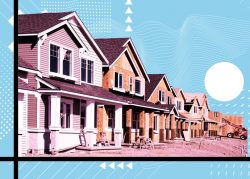Residential construction continued to surge as 2020 came to an end, finishing off homebuilding’s busiest year since the housing bubble burst.
Housing starts in December increased for the fourth month in a row to an annual rate of 1.67 million units, seasonally adjusted, according to the Census Bureau’s monthly report on residential construction. That’s a 5.8 percent increase from November’s revised rate and up 5.2 percent year-over-year.
Overall, the number of housing units that started construction last year was up 7 percent from 2019.
Joel Kan, head of industry forecasting for the Mortgage Bankers Association, called it “the strongest for residential construction since 2006.”
Read more



Residential projects have dominated construction spending as demand and housing prices have continued to rise with inventory shrinking and interest rates remaining low. But there are some headwinds: Homebuilder sentiment has dipped over the past two months and mortgage rates have crept up.
The annual rate of building permits in December was 1.7 million, seasonally adjusted — about 4.5 percent higher than November’s rate and up more than 17 percent year-over-year. Kan pointed to the continued uptick in permits for single-family homes as an indication of new supply to come.
The rate of housing completions also increased to 1.4 million units, seasonally adjusted. That was up about 16 percent from November’s revised rate and up 8 percent year-over-year.
